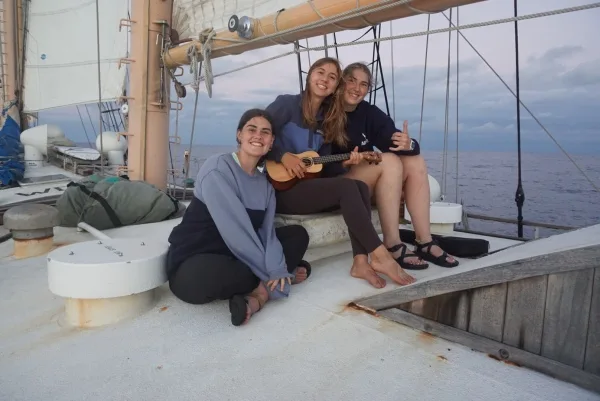Programs Blog
What day is it?

Talia Felcher, A Watch, Scripps College
Ship’s Log
Noon Position
34°39.84’ N, 149°48.12’ W
Ship Heading
100.9°
Ship Speed
7.5 knots
Weather / Wind
Getting colder but sunny somewhat sunny
Sail Plan
Sailing East with the Main Sail, Mainstays’l, and Forestays’l
As someone who has grown up in the Pacific Northwest, I have learned to love to simplistic lifestyle while backpacking and exploring the outdoors. So far, I’ve seen many parallels with living on the Robert C. Seamans. Most days consist of science, sailing, class/work, eating, and sleeping.
We’ve been thrown a ton of information in the past 10 days while on deck from our mate (shoutout to Ava, first mate, for sharing all your wisdom and beautiful singing) and in lab (shoutout to Amy for always bringing your contagious positive energy and keeping lab interesting even on dawn watch).
 Plastics overwhelming the pristine bucket Neuston tow contents
Plastics overwhelming the pristine bucket Neuston tow contents
Today marks the start of our second phase of the sea component: the shadow phase. During this phase we shadow either our sailing mate or scientist and learn about their entire thought process over the watch.
When reflecting on the past 10 days, I am grateful for all the fun, exciting, and thrilling moments but more importantly the sea sickening, tough, stressful, sweaty, and wet moments… I don’t think any of us realized what we were getting ourselves into when we boarded the Seamans in Hawai’i, but it’s all been far worth it.
I just got off dawn watch from 01:00 to 0:700 and am hoping to get in a few hours of sleep before class and evening watch. During dawn watch, we stopped motoring for a few hours and it was the most still the boat has felt and the most peaceful the water has ever looked especially during sunrise, where I also managed to see my first ever full rainbow!
During dawn watch, we processed the 021-station Neuston tow and are seeing the numbers of microplastics rapidly increase as we move further into the gyre. At the beginning of our voyage, we counted around 5-10 pieces of microplastics and now the number has gone beyond 750 in a single net tow (this one took us over 5 hours to count during dawn watch). The amount of large plastic debris during our 6-minute hourly observations has also heavily increased. We’re expecting to soon find thousands of pieces of plastic in a single net tow that only covers 1 nautical mile… While this voyage and the challenging moments have been very rewarding, it’s hard not to let the massive amounts of plastic overwhelm my thoughts each day especially as I experience what it’s like to be living at sea surrounded by this incredibly beautiful marine ecosystem. This voyage has shown me the urgency surrounding plastic production and pollution – while it feels devastating at times, this special group of people on this voyage has inspired me and brought me hope towards the future of our current plastic issue. Everyone here has so much wisdom to share and all have their own ideas and stories they bring to the (gimbled boat) table. Patrick, one of the ‘others’ (who is sitting next to me in the library) is saying we must hold onto some sort of hope and enjoy the present moments on this boat like the full rainbow, daily boat wordle, valve day, or the 6 delicious scone types for afternoon snack today.
To Dad, I thank you for the lovely stars book you gifted me for this trip from your own SEA Semester voyage. It’s been pretty special studying the constellations out in the middle of the Northern Pacific Ocean where you once were in the same boat (had to add the pun).
Talia Felcher, A Watch, Scripps College
Recent Posts from the Ships
- Ocean Classroom 2024-A collaborative high school program with Proctor Academy
- Collaborations and Long-term Commitments: SEA’s Caribbean Reef Program Sets a Course for Coastal Programs that Compliment Shipboard Experiences.
- Sea Education Association students prepare for life underway using state of the art nautical simulation from Wartsila Corporation.
- SEA Writer 2022, Magazines From the Summer SEA Quest Students
- Technology@SEA: Upgrades Allow Insight into Ocean Depths
Programs
- Gap Year
- Ocean Exploration
- High School
- Science at SEA
- SEA Expedition
- SEAScape
- Pre-College
- Proctor Ocean Classroom
- Protecting the Phoenix Islands
- SPICE
- Stanford@SEA
- Undergraduate
- Climate and Society
- Climate Change and Coastal Resilience
- Coral Reef Conservation
- Marine Biodiversity and Conservation
- MBL
- Ocean Exploration: Plastics
- Ocean Policy: Marine Protected Areas
- Oceans and Climate
- Pacific Reef Expedition
- The Global Ocean: Hawai'i
- The Global Ocean: New Zealand